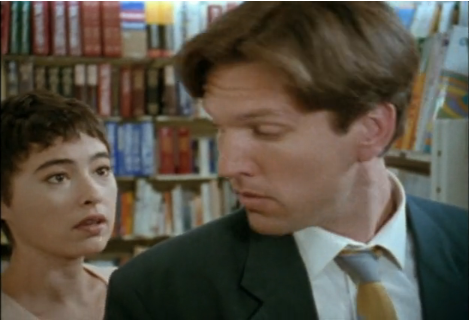Hal Hartley’s newest film, Meanwhile, is said to be about a man who can do everything from plumbing to international finance to novel-writing, but who can’t seem to find “success.” But how do we measure success? In a quarter-century of iconoclastic filmmaking, Hal Hartley movies has redefined the “achievement” as it pertains to film. As Meanwhile made its debut at IFC center February, 2012, we celebrated several of Hal Hartley films that are available on Fandor with a tribute to classic Hartley moments, especially from his excellent 1991 film, Surviving Desire.
[iframe src=”http://player.vimeo.com/video/37565198?title=0&byline=0&portrait=0&color=ffffff” width=”600″ height=”480″ frameborder=”0″ webkitAllowFullScreen mozallowfullscreen allowFullScreen]
TRANSCRIPT:
It’s not hard to find great moments in Hal Hartley films, among them:
Accomplice
Adventure
A/Muse
Apologies
Implied Harmonies
Especially in Surviving Desire. Depressed college lit professor Jude (Martin Donovan) is having another rough day in class. Reading the same passage from Dostoyevsky that he’s been stuck on all month, he pays no heed to his students as they threaten to mutiny. Instead, a passing glance at his student Sofie (Mary B. Ward) distracts him from the clamor. Hal Hartley movies doesn’t make it easy for himself by kicking off Surviving Desire amidst so many disruptions. But he steers us through with surgical precision in one of the best classroom sequences in cinema. With a brisk combination of sharp edits, fluid camera movements and striking staging of his actors, Hartley masterfully plants us in Jude’s off-kilter state of mind.
There are several wonderful one-liners laced throughout the film:
“You can’t beat up students because they don’t like Dostoyevsky.”
“You can’t just waltz here, use my toaster and start spouting universal truths without qualification.”
“I thought you wanted to get married.” “I just wanted somebody to ask.”
But this one takes the cake:
“Oh, I feel much better now. Waitresses are suddenly much prettier than when I first came in. Ambient chatter is less irritating. Daylight’s not threatening me anymore. It’s just filling the street for no apparent reason.”
Jude finally acts on his infatuation with Sofie by camping out at the bookstore where she works and ambushing her with a passage from Dostoyevsky. What ensues is one of the more intense bookstore pas de deux in movie history, fueled by a conversational rhythm that’s archly unnatural, yet feverishly insistent, as they paddle questions back and forth at each other, speaking as if no one else within earshot can understand. The scene shimmers with genuine sparks of infatuation. “You seem alive. That book you’re reading seems alive too.”
Moments one and three amply demonstrate how much of a musical sense Hartley has in his direction, but if those aren’t enough, this is the clincher. After experiencing his first kiss with Sofie, Jude leaps right into an impromptu dance number with two random bystanders in an empty city lot. It’s a moment inspired straight out of MGM musicals, except it doesn’t have any music. Which makes it all the more stunning to behold. The music is in Jude’s head, and in Hartley’s. And in ours.
Kevin B. Lee is Editor in Chief of IndieWire’s PressPlay Video Blog and contributor to Roger Ebert.com. Follow him on Twitter






